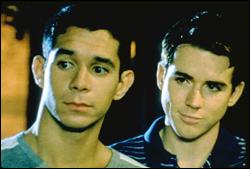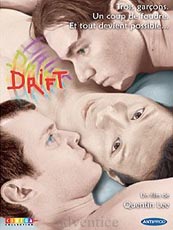Watching Trick, the movie by Jim Fall starring Christian Campbell, J.P. Pitoc and Tori Spelling, can be, uhm, tricky when one is in a reflective mood. Actually most people will say “lonely” mood but I’d prefer “reflective” or better yet, “self-aware” mood. It’s all semantics, baby, yeah.
 Anyway, on to Trick. It’s structured like a classic Hollywood romantic comedy—two guys meet, they are attracted to each other, but people and circumstances converge to prevent the two from really hooking up, including the oh-so-needy-but-misunderstood-best-friend, but after several mix-ups and the prerequisite big confrontation and revelation scene, the two eventually declare their feelings, and eventually end up with a passionate on-screen kiss before movie fades to black. Roll end credits. Because everything is a cliché the movie is actually a tricky act to pull off successfully. But succeed it does. I mean, can anyone really believe that a guy as cute as Chris Campbell (wow, feeling ka-close na ako sa kanya! Er, he’s the one on the right in the picture below. John Paul Pitoc is the one on the left—he’s hot too!) can’t find someone interested in him? C’mon, pull our legs some more, puh-leez! But this is a rom-com, so you go with the flow. And the movie actually flows quite smoothly over those implausible spots. It even manages to end with a character launching into a song that continues over to the end credits roll.
Anyway, on to Trick. It’s structured like a classic Hollywood romantic comedy—two guys meet, they are attracted to each other, but people and circumstances converge to prevent the two from really hooking up, including the oh-so-needy-but-misunderstood-best-friend, but after several mix-ups and the prerequisite big confrontation and revelation scene, the two eventually declare their feelings, and eventually end up with a passionate on-screen kiss before movie fades to black. Roll end credits. Because everything is a cliché the movie is actually a tricky act to pull off successfully. But succeed it does. I mean, can anyone really believe that a guy as cute as Chris Campbell (wow, feeling ka-close na ako sa kanya! Er, he’s the one on the right in the picture below. John Paul Pitoc is the one on the left—he’s hot too!) can’t find someone interested in him? C’mon, pull our legs some more, puh-leez! But this is a rom-com, so you go with the flow. And the movie actually flows quite smoothly over those implausible spots. It even manages to end with a character launching into a song that continues over to the end credits roll. The problem with rom-coms is that they often fade out at a high and happy point. But life never stops at those high and happy moments. In fact they always are messier than what is shown onscreen. If one wants his life to end up like a Hollywood ending, then he should end his life after a particularly high point. Like maybe after finally getting the guy he’s going out with to agree to become his boyfriend, he should slash his wrists right there and then. Or after celebrating their fifth anniversary, a couple should just jump off a building. Of course in a Hollywood ending the fade out happens before the slashing or the jumping off.
The problem with rom-coms is that they often fade out at a high and happy point. But life never stops at those high and happy moments. In fact they always are messier than what is shown onscreen. If one wants his life to end up like a Hollywood ending, then he should end his life after a particularly high point. Like maybe after finally getting the guy he’s going out with to agree to become his boyfriend, he should slash his wrists right there and then. Or after celebrating their fifth anniversary, a couple should just jump off a building. Of course in a Hollywood ending the fade out happens before the slashing or the jumping off.  So it was a good thing that after watching Trick I immediately watched Drift, a movie by Quentin Lee, an Asian-Canadian gay filmmaker. It’s about Ryan and Joel, a couple who breaks up after three years. The lead character, Ryan, is an Asian American who feels that he’s just drifting in the relationship, so he calls everything off on the eve of their anniversary. The movie then effortlessly drifts into three alternative endings: one wherein Ryan replaces Joel with a crush he met when they were still a couple; another wherein Ryan and Joel get back together again; and a third wherein Ryan ends up alone but not regretting any of his decisions. All three endings are in their own way “happy” endings, but the audience also sees the compromises and the what-ifs and the trade-offs that accompany each so-called happy ending. By the third ending, the audience gets the drift: there really are no happy endings, but endings are as happy or as sad depending on how we make them to be—and depending on where the fade out happens.
So it was a good thing that after watching Trick I immediately watched Drift, a movie by Quentin Lee, an Asian-Canadian gay filmmaker. It’s about Ryan and Joel, a couple who breaks up after three years. The lead character, Ryan, is an Asian American who feels that he’s just drifting in the relationship, so he calls everything off on the eve of their anniversary. The movie then effortlessly drifts into three alternative endings: one wherein Ryan replaces Joel with a crush he met when they were still a couple; another wherein Ryan and Joel get back together again; and a third wherein Ryan ends up alone but not regretting any of his decisions. All three endings are in their own way “happy” endings, but the audience also sees the compromises and the what-ifs and the trade-offs that accompany each so-called happy ending. By the third ending, the audience gets the drift: there really are no happy endings, but endings are as happy or as sad depending on how we make them to be—and depending on where the fade out happens.
I’m glad I watched both films. Trick puts a smile in your face, while Drift puts that smile in its proper place.
(Both films can be found on VCD format at Top & Bottom, on top of O Bar, 1800 Orosa St. corner Nakpil Street, Malate, Manila.)

1 comment:
I love watching Trick, I can very much relate to Gabriel's character. Someone having a hard time looking for hook ups. Nyahahaha.
-XP-
Post a Comment